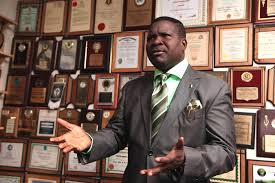
Constitutional lawyer, Prof. Mike Ozekhome has launched a critical rejoinder against columnist Simon Kolawole, accusing him of deliberately misrepresenting The Patriots’ position on Nigeria’s 1999 Constitution.
In a comprehensive response to Kolawole’s July 27, 2025 opinion piece in ThisDay titled “Back to the 1999 Constitution – Again?” the Senior Advocate of Nigeria dismissed the columnist’s interpretation as resting on “selective history, unverified assumptions, and a concerning disregard for legal scholarship and political truth.”
Ozekhome, writing on behalf of The Patriots—a collective of elder statesmen and constitutional scholars—accused Kolawole of portraying the group as “revisionists of Nigeria’s constitutional history” while fundamentally mischaracterizing their longstanding arguments for constitutional restructuring.
The constitutional expert vehemently denied Kolawole’s claim that the Patriots had falsely asserted that the 1999 Constitution was “written by the military,” describing this as a “complete mischaracterization” of their actual position.
“The Patriots have never claimed that soldiers sat down with pens and drafted the Constitution in a vacuum,” Ozekhome stated. “What they have consistently stated is that the 1999 Constitution is a product of military imposition, lacking the democratic legitimacy that should accompany any foundational legal document in a pluralistic society such as Nigeria.”
Drawing from historical statements by founding Patriots members, Ozekhome quoted Professor Ben Nwabueze’s assertion that “The 1999 Constitution was imposed by a military regime without a referendum, without public debate, and without the participation of the Nigerian people. It cannot therefore be considered a people’s Constitution.”
The legal luminary emphasized that The Patriots’ use of the term “military Constitution” refers not to literal authorship by soldiers, but to “the flawed process of imposition and the absence of participatory legitimacy through a people’s referendum.”
Ozekhome traced Nigeria’s constitutional evolution from the regional autonomy that characterized the First Republic (1960-1966) to the current overcentralized system, arguing that the military’s inherently centralist command structure dismantled the federal structure that once allowed regions substantial control over local affairs.
“With about 374 ethnic groups, at least 500 spoken languages and strong regional identities, a one-size-fits-all approach to governance is both ineffective and inflammatory,” he argued, citing examples of how uniform federal policies often prove inappropriate across Nigeria’s diverse states.
The Senior Advocate launched a particularly fierce attack on the Constitution’s Exclusive Legislative List, which contains 68 items under federal government control, describing it as “excessive and counter-productive in a federal system we pretend to operate.”
He highlighted the contradiction whereby state governors are constitutionally described as “chief security officers” but cannot control police forces within their borders, noting that this “unitarism has proven disastrous” in addressing security challenges across different regions.
Drawing comparisons with federal systems in the United States and India, Ozekhome argued that Nigeria’s overcentralization has created “a reactive and overstretched federal police, further alienating citizens from security providers.”
The constitutional expert challenged the legitimacy of the National Assembly’s role in constitution-making, questioning whether “a creature of a flawed document” can presume to rebirth itself. He argued that the legislature, being a product of the 1999 Constitution, cannot claim authority to author a new grundnorm that overrides its own existential basis.
“The National Assembly’s attempts at constitutional amendment—however noble—have largely been elitist and parliamentary, not popular or plebiscitary,” Ozekhome observed, noting that despite several constitutional alteration bills being passed, none has bridged “the democratic gap of a sovereign national consensus.”
Distinguishing between constitutional reform and rewriting, the legal scholar argued that “Reform is cosmetic; rewriting is foundational. The former merely plasters the gaping cracks of a collapsing edifice. The latter reconstructs its very foundation.”
He criticized Nigeria’s approach of “tentative and timid reforms” through amendments as merely “tinkering with clauses” within the same defective framework, comparing it to “repainting a termite-ridden house while ignoring the need to first fumigate and wholly rebuild.”
Ozekhome cited successful constitutional transformations in countries like Kenya, South Africa, Ghana, and the United States as models for Nigeria, emphasizing that all these nations achieved legitimacy through referendums that gave citizens direct voice in their constitutional processes.
“What unites these examples is one common thread—referendum. This is the power of the people expressed directly,” he stated, arguing that referendum makes a Constitution “autochthonous, homegrown, people-owned.”
The Patriots’ representative outlined a detailed five-step process for Nigeria’s constitutional renewal, beginning with enabling legislation to establish a 110-member Constituent Assembly elected on a non-partisan basis, with three representatives from each senatorial zone.
This Constituent Assembly would draft a new constitution through extensive public consultations, drawing from various sources including the 1960 Independence Constitution, the 2014 National Conference Report, and submissions from civil society, traditional leaders, and other stakeholders.
The process would culminate in a national referendum where citizens would either accept or reject the new Constitution through a simple yes-or-no vote, similar to Kenya’s 2010 model, or through a clause-by-clause referendum allowing granular endorsement.
Addressing concerns about institutional legitimacy, Ozekhome emphasized that this process “blends legality via executive and legislative action with legitimacy via citizen participation and referendum,” affirming that sovereignty resides with the people rather than the political class.
The constitutional expert concluded with a passionate call to action, describing Nigeria as standing “not merely at a constitutional crossroads, but at a moral precipice” under the weight of “imposed structures that neither resemble nor respect its people’s will.”
“It is no longer a question of whether the 1999 Constitution is flawed. That is settled. It is a graveyard of imposed ideas, a mausoleum of military fiat dressed in borrowed democratic robes,” Ozekhome declared.
He urged all Nigerians—from activists to farmers, from professors to market traders—to support the constitutional renewal process, calling for the President to initiate enabling legislation, the National Assembly to pass it into law, and civil society to mobilize grassroots dialogues.
“Let it be said of this generation: They inherited a broken Constitution. They rebuilt it and gave us a new one,” Ozekhome concluded, recommending this perspective to Kolawole and others to properly understand The Patriots’ position on Nigeria’s constitutional future.



